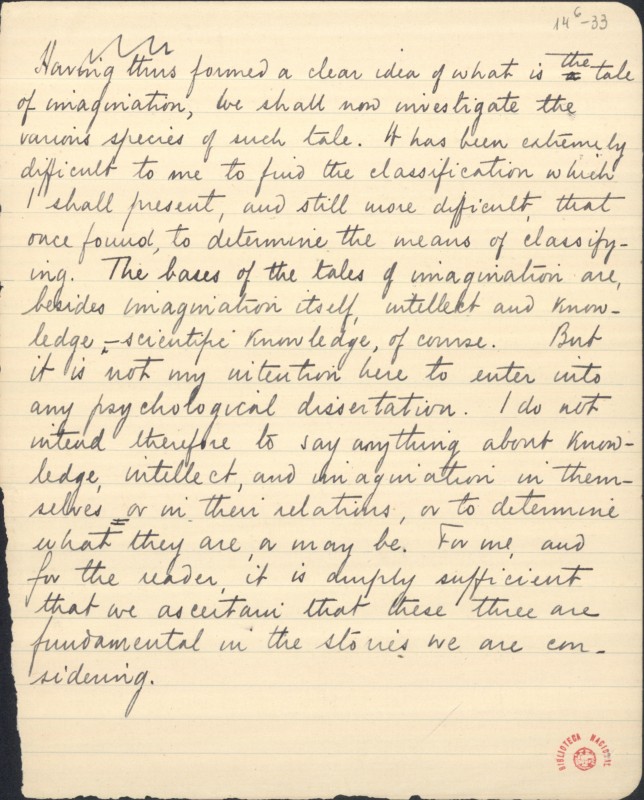Identificação
[BNP/E3, 146 – 33v-33r]
On the Tale of Imagination.[1]
I.
All work of the human mind is divisible, subjectively, into 3 classes; it can be traced to 3 forms of the inner being of man: imagination, intellect and knowledge. The author employs imagination when he creates, absolutely out of nothing so to speak; he employs intellect when he makes one thing from another, when he deduces, when he induces, when he concludes from premises; he employs knowledge when he does but set forth what he has acquired, when he creates – to speak truly – only the aggregate phrases, of his exposition.
A treatise on psychology, on sociology, on physics, on chemistry, on dressmaking, is a scientific work, so long as what it contains is but an exposition of knowledge, containing nothing original. If it contains anything original, it becomes at once a scientific-intellectual work.
An entirely original treatise on philosophy – a treatise which {…} intellectual.
[33r]
Having thus formed a clear idea of what is the tale of imagination, we shall now investigate the various species of such tale. It has been extremely difficult to me to find the classification which I shall present, and still more difficult, that once found, to determine the means of classifying. The bases of the tales of imagination are, besides imagination itself, intellect and knowledge – scientific knowledge, of course. But it is not my intention here to enter into any psychological dissertation. I do not intend therefore to say anything about knowledge, intellect, and imagination in themselves or in their relations, or to determine what they are, or may be. For me, and for the reader, it is simply sufficient that we ascertain that these three are fundamental in the stories we are considering.
[BNP/E3, 146 – 33v-33r]
Sobre o conto de imaginação.
I.
Todo o trabalho da mente humana é divisível, subjectivamente, em 3 classes; pode ser atribuído a 3 formas do ser interior do homem: imaginação, intelecto e conhecimento. O autor emprega a imaginação quando cria, absolutamente do nada, por assim dizer; ele emprega o intelecto quando faz uma coisa a partir de outra, quando deduz, quando induz, quando conclui a partir de premissas; ele emprega o conhecimento quando o faz, mas expõe o que adquiriu, quando cria – para falar verdadeiramente – apenas as frases agregadas da sua exposição.
Um tratado de psicologia, de sociologia, de física, de química, de costura, é uma obra científica, na medida em que o que contém é apenas uma exposição de conhecimento, sem nada de original. Se contém algo original, torna-se imediatamente uma obra científico-intelectual.
Um tratado de filosofia inteiramente original – um tratado que {…} intelectual.
[33r]
Tendo assim formado uma ideia clara do que é o conto da imaginação, vamos agora investigar as várias espécies de tal conto. Tem sido extremamente difícil para mim encontrar a classificação que apresentarei, e ainda mais difícil, uma vez encontrada, determinar os meios de classificação. As bases dos contos de imaginação são, além da própria imaginação, o intelecto e o conhecimento – conhecimento científico, é claro. Mas não é minha intenção aqui entrar em qualquer dissertação psicológica. Não pretendo, portanto, dizer nada sobre conhecimento, intelecto e imaginação em si mesmos ou em suas relações, ou determinar o que são ou podem ser. Para mim, e para o leitor, é simplesmente suficiente verificarmos que esses três são fundamentais nas histórias que estamos a considerar.
[1] plot plot. plot.


